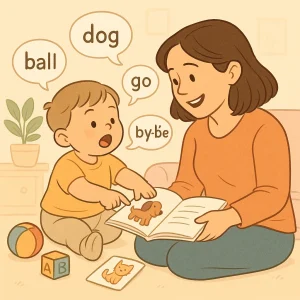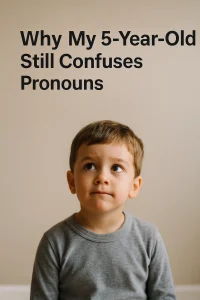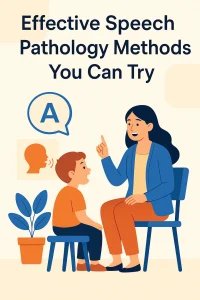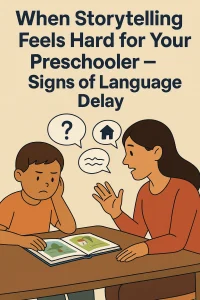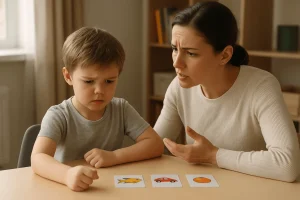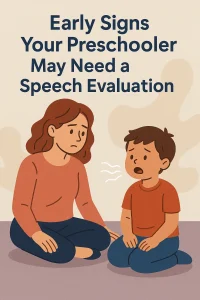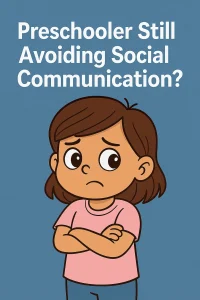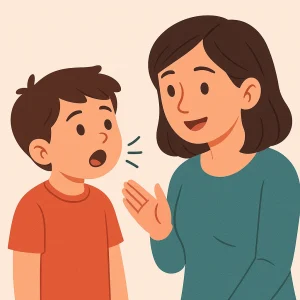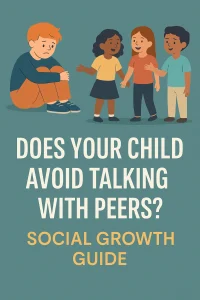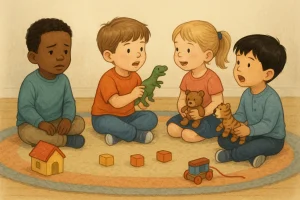What to Do If Your Toddler is Nonverbal: Expert Tips and Early Help
Last Updated: August 11, 2025
Welcome to our guide on understanding and helping your nonverbal toddler. If your little one isn’t speaking yet, it can be a source of worry and stress. You might find yourself comparing your child’s progress to that of other children, or feeling anxious when milestones aren’t met as expected. Rest assured, you are not alone. Many parents share this concern and wonder if there’s something more they could be doing.
Nonverbal toddlers, or those who don’t use words to communicate, can still find ways to express themselves. It’s essential to remember that every child develops at their own pace, and there are many effective strategies to support their communication skills. This article is here to provide you with practical tips and insights, helping you navigate this journey with confidence and hope.
Free Speech Help for Kids
Concerned about speech delays? Book a free consultation with our expert speech therapist and get guidance tailored to your child’s needs.
Understanding Nonverbal Toddlers
Definition of a Nonverbal Toddler
A nonverbal toddler is a child who does not use words to communicate by the age they are typically expected to. This might mean your child is not saying any words by 15 months or is using very few words by 24 months. Instead of words, they might use sounds, gestures, or facial expressions to express their needs and emotions.
Explanation of Individual Developmental Paces
Every child develops at their own pace, and it’s important to remember that being nonverbal at a certain age doesn’t necessarily indicate a long-term issue. Some children might be early talkers, while others take a bit more time to develop their speech. Various factors can influence speech development, including genetics, environment, and even the child’s unique personality.
It’s crucial to observe your child’s overall communication skills, not just their verbal abilities. Pay attention to how they use gestures, make eye contact, and respond to social interactions. These nonverbal cues are foundational skills that support later language development.
Why Understanding Developmental Paces Matters
Understanding that each child has a unique developmental timeline can help alleviate some of the anxiety surrounding speech delays. It also underscores the importance of personalized approaches to supporting your child’s communication skills. By focusing on your child’s strengths and interests, you can create a supportive environment that encourages gradual progress in their own time.
Early Signs and When to Seek Help
Typical Speech Milestones
If your toddler isn’t meeting these milestones, it might indicate a speech delay in toddlers Here are some general guidelines:
- By 12 months: Your child should be able to say simple words like “mama” or “dada,” imitate sounds, and use gestures such as pointing or waving.
- By 18 months: Your child should start to use a few single words consistently and understand simple commands like “come here” or “give me.”
- By 24 months: Your child should use two-word phrases like “more milk” and have a vocabulary of around 50 words. They should also be able to follow simple instructions.
Indicators of Speech Delay
If your toddler isn’t meeting these milestones, it might indicate a speech delay. Here are some signs to watch for:
- No babbling by 12 months: Babbling is an early stage of speech development. If your child isn’t making sounds like “ba-ba” or “da-da,” it could be a sign of a delay.
- No single words by 16 months: If your toddler hasn’t said their first word by this age, it might be time to seek advice.
- No two-word phrases by 24 months: Not using simple two-word combinations like “more juice” can indicate a speech delay.
- Limited interest in communication: If your child isn’t using gestures, making eye contact, or showing an interest in interacting with others, these could be additional signs.
When to Consult a Pediatrician or Speech Therapist
If your child has not spoken their first word by 15 months, consider online speech therapy for early support.. Here’s when to seek professional help:
- By 15 months: If your child has not spoken their first meaningful word, it’s a good idea to consult a pediatrician.
- If progress stalls: If your child was making progress but suddenly stops or regresses in their speech development, it’s important to get professional advice.
- Frustration during communication: If your child frequently seems frustrated when trying to communicate, it might indicate they need support.
Typical Speech Milestones
| Age | Milestone |
|---|---|
| 12 months | – Says simple words like “mama” or “dada” – Imitates sounds – Uses gestures such as waving or pointing |
| 18 months | – Uses a few single words consistently (e.g., “ball,” “no”) – Understands simple commands (e.g., “come here”) – Points to objects of interest |
| 24 months | – Uses two-word phrases (e.g., “want cookie,” “more juice”) – Has a vocabulary of around 50 words – Follows simple instructions (e.g., “get your shoes”) |
Strategies to Encourage Communication
Encourage Play and Social Interaction
Importance of Play in Learning Language: Play is a natural and enjoyable way for children to learn language. Through play, toddlers explore the world around them and develop crucial social and communication skills. It provides a relaxed environment where they can express themselves freely, making it easier to practice new words and sounds.
Examples of Interactive Games and Activities
- Singing Songs and Nursery Rhymes: These are fun and repetitive, making it easier for your child to learn and remember words.
- Playing Pretend: Engage in pretend play with toys like dolls, cars, or kitchen sets. This helps your child practice naming objects and actions.
- Interactive Storytelling: Use picture books and encourage your child to point to and name objects in the pictures. Make the stories interactive by asking questions about what’s happening in the book.
- Simple Board Games: Games that require taking turns and following simple instructions can enhance communication skills.
Imitate Your Child
Benefits of Mimicking Sounds and Actions: Imitating your child’s sounds and actions can encourage them to communicate more. It shows them that their attempts at communication are valuable and that you are listening.
Examples of Positive Imitation
- If your child makes a sound like “ba-ba,” repeat it back to them and smile.
- When they roll a toy car, you roll one too and make similar noises.
- If they clap their hands, join in and clap with them. This can turn into a fun game that encourages more interaction.
Focus on Nonverbal Communication
Use of Gestures and Eye Contact: Nonverbal communication, such as gestures and eye contact, is a crucial part of language development. It helps build the foundation for verbal communication by teaching your child the basics of interaction.
Examples of Exaggerated Gestures
- Point to objects while saying their names, like pointing to a ball and saying “ball.”
- Use hand signals like waving goodbye or nodding for yes and shaking your head for no.
- Make big, exaggerated gestures to capture your child’s attention and make it easier for them to imitate.
Leave Space for Communication
Importance of Waiting for Responses: It’s natural to want to fill in the gaps when your child doesn’t respond immediately, but giving them time to process and respond is essential. This encourages them to try communicating on their own.
Techniques to Encourage Responses
- Ask a question and wait for several seconds while looking at your child expectantly. Even if they don’t respond verbally, acknowledge any sound or gesture they make.
- Use prompts like “What do you want?” and then pause to give them a chance to answer.
Simplify Your Language
Using Simple Words and Phrases Using simple language makes it easier for your child to understand and imitate you. Start with single words and gradually build up to short phrases as they begin to respond.
Examples of Simplified Language
- If your child is playing with a ball, you can say “ball” or “roll.”
- For a more advanced child, use short phrases like “roll ball” or “throw ball.”
- Keep your sentences short and to the point, matching their current level of understanding.
Follow Your Child’s Interests
Talking About What Your Child is Doing: Children are more likely to engage and communicate when the topic is something they are interested in. Narrating their actions helps them make connections between words and their meanings.
Examples of Narrating Activities
- If your child is playing with blocks, you can say, “You’re building a tower. Look, a tall tower!”
- When they are coloring, comment with, “You’re using the blue crayon. Blue is such a nice color.”
- Follow their lead in play and talk about what they are focused on, which keeps them engaged and encourages more communication.
When to Start Speech Therapy
Signs Indicating the Need for Professional Help
It’s important to recognize when your nonverbal toddler might need professional support to develop their communication skills. Here are some key signs that indicate it’s time to consult a speech therapist:
- No First Words by 15 Months: If your child hasn’t spoken their first word by this age, it might be a sign of a delay.
- Limited Vocabulary by 24 Months: If your child uses fewer than 50 words or isn’t forming two-word phrases by the age of two, they may need help.
- Regressions in Speech: If your child was speaking but then lost the ability to say words they previously used, it’s important to seek help.
- Frustration During Communication: Frequent frustration when trying to communicate can indicate that your child needs more support to express themselves.
Benefits of Early Intervention
Early intervention can make a significant difference in your child’s ability to communicate. Here are some benefits of starting speech therapy early:
- Improved Communication Skills: Benefits of Early speech therapy can help your child develop the skills they need to communicate effectively.
- Reduced Frustration: Learning new ways to express themselves can reduce your child’s frustration and improve their overall well-being.
- Better Social Interaction: Enhanced communication skills can help your child interact more successfully with peers and family members.
- Stronger Academic Foundation: Early speech intervention can lay the groundwork for better academic performance in the future.
How to Start the Process with a Speech Therapist
Beginning speech therapy can seem daunting, but following these steps can make the process smoother:
- Consult Your Pediatrician: Your child’s pediatrician can provide an initial assessment and refer you to a speech therapist if needed. They can help you understand whether your child’s communication skills are developing typically or if there’s a need for intervention.
- Schedule an Evaluation: Find a licensed speech therapist who specializes in working with young children. Schedule an evaluation to get a detailed understanding of your child’s specific needs and to create a tailored therapy plan.
- Prepare for the Appointment: Gather information about your child’s current communication methods, any words they use, and their general behavior. This information will help the therapist make an accurate assessment.
- Follow the Therapist’s Recommendations: After the evaluation, follow the therapist’s recommendations for therapy sessions and at-home activities. Consistency is key to making progress.
- Monitor Progress: Regularly review your child’s progress with the therapist. Adjust the therapy plan as needed to ensure your child continues to develop their communication skills.
Practical Tips for Parents
Daily Communication Practices
Using Daily Routines for Practice: Incorporating communication practice into your daily routines can be a simple yet effective way to help your nonverbal toddler. Everyday activities provide natural opportunities to encourage language development. Here’s how you can make the most of these moments:
- Mealtime: Use this time to name foods, utensils, and actions. For example, say “banana,” “spoon,” or “eat” as you and your child interact with these items.
- Bath Time: Talk about the toys and actions during bath time. Use words like “water,” “splash,” “soap,” and “clean” to build vocabulary.
- Playtime: Engage in activities that involve naming and describing objects and actions. For instance, if your child is playing with blocks, you can say, “stack,” “block,” and “fall.”
- Bedtime: Incorporate stories and songs into your bedtime routine. Reading books together and singing lullabies can enhance language skills through repetition and rhythm.
Prompting One Level Higher Than Current Skills: To encourage your child’s language development, try prompting them one level higher than their current communication skills:
- If they use gestures: Encourage them to make sounds or simple words. For instance, if they point to a toy, say “toy” and encourage them to repeat it.
- If they use single words: Prompt them to use two-word phrases. If they say “ball,” you can encourage them to say “red ball” or “big ball.”
- If they use two-word phrases: Encourage them to form simple sentences. If they say “want juice,” you can prompt them to say, “I want juice.”
Patience and Encouragement
Importance of Patience: Patience is key when helping your nonverbal toddler develop their communication skills. Progress may be slow, and it’s important to remain calm and supportive. Avoid showing frustration if your child struggles to communicate. Instead, celebrate their efforts and provide gentle encouragement.
Celebrating Small Victories: Every small step in your child’s communication journey is worth celebrating. Recognize and praise their achievements, no matter how minor they seem:
- Verbal Praise: Use positive reinforcement like “Good job!” or “You did it!” to encourage your child.
- Physical Affection: Hugs, high-fives, and smiles can show your child that their efforts are appreciated.
- Rewards: Occasionally, offer small rewards like stickers or extra playtime for their progress. This can motivate them to keep trying.
Conclusion
In this guide, we’ve explored how to help your nonverbal toddler develop their communication skills. We discussed what it means to be nonverbal and the importance of understanding individual developmental paces. We also covered typical speech milestones, signs that indicate the need for professional help, and practical strategies to encourage communication. These strategies include using play, imitating your child, focusing on nonverbal communication, waiting for responses, simplifying language, and following your child’s interests. Additionally, we talked about the benefits of assistive technologies and when to start speech therapy.
Supporting a nonverbal toddler can be challenging, but remember to celebrate every small step forward. Patience, consistency, and positive reinforcement are key. If you need more personalized advice, visit Wellness Hub. We offer resources and support tailored to your child’s needs. With the right strategies and support, your child can develop their communication skills and find their unique voice. Remember, you are not alone in this journey.
Frequently Asked Questions:
1. What is a nonverbal toddler?
A nonverbal toddler is a child who does not use words to communicate by the age they are typically expected to. They might use sounds, gestures, or facial expressions to express their needs and emotions instead of spoken words.
2. What are the signs that my toddler might need speech therapy?
Signs that your toddler might need speech therapy include not saying their first word by 15 months, using fewer than 50 words by 24 months, losing previously acquired speech skills, and showing frustration during communication attempts.
3. How can I help my nonverbal toddler communicate?
You can help your nonverbal toddler communicate by encouraging play and social interaction, mimicking their sounds and actions, using gestures and eye contact, waiting for their responses, simplifying your language, and following their interests.
4. What are some effective games and activities to encourage speech in toddlers?
Effective games and activities to encourage speech include singing songs and nursery rhymes, engaging in pretend play, interactive storytelling with picture books, and playing simple board games that require turn-taking and following instructions.
5. How do assistive technologies help nonverbal toddlers?
Assistive technologies, such as picture exchange communication systems (PECS), speech-generating devices (SGDs), visual schedules, and communication boards, help nonverbal toddlers express their needs and thoughts, reduce frustration, and encourage language development.
6. When should I start speech therapy for my nonverbal toddler?
You should consider starting speech therapy if your child has not spoken their first word by 15 months, shows limited vocabulary by 24 months, experiences regressions in speech, or frequently seems frustrated when trying to communicate.
7. What are the benefits of early intervention in speech therapy?
Early intervention in speech therapy can improve communication skills, reduce frustration, enhance social interactions, and provide a stronger academic foundation for your child.
8. How can daily routines help in developing my toddler’s communication skills?
Daily routines provide natural opportunities to practice language skills. Use mealtime, bath time, playtime, and bedtime to name objects, describe actions, and encourage your child to communicate.
9. What should I do if my child is not responding to my efforts to encourage speech?
If your child is not responding to your efforts, consult with a pediatrician or speech therapist. They can provide a professional assessment and recommend appropriate interventions and strategies.
10. How can I find the right speech therapist for my toddler?
To find the right speech therapist, ask for referrals from your pediatrician, search for licensed speech therapists in your area, and ensure they have experience working with young children. Wellness Hub offers resources and guidance to help you find a qualified therapist.
About the Author:
Anuradha Karanam
Speech-language pathologist (7+ years of experience)
Anuradha Karanam is a skilled speech-language pathologist with over 6 years of experience. Fluent in Tamil, Telugu, Hindi, and English, she specializes in parent counseling, speech sound disorders, fluency assessment, and speech-language evaluations. Anuradha excels at working with children with developmental disorders, offering creative and effective therapy programs. Currently, at Wellness Hub, she holds a BASLP degree and is registered with the RCI (CRR No A85500). Her patience, ambition, and dedication make her a trusted expert in her field.
Book your Free Consultation Today
Parent/Caregiver Info:
Client’s Details:
* Error Message
